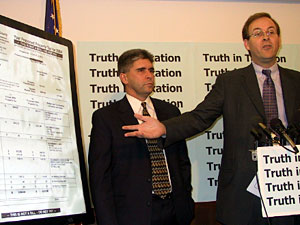|
Audio
Photos
Your Voice
|
DFLers say property tax bills show unfairness of revenue cuts
December 11, 2003
 |
| Rep. Joe Atkins, DFL-Inver Grove Heights, left, and Rep. Matt Entenza, DFL-St. Paul, criticized what they say are unfair property tax bills around the metro. (MPR Photo/Laura McCallum) |
St. Paul, Minn. — House DFLers say an analysis of proposed property taxes shows a pattern of winners and losers. Minority Leader Matt Entenza of St. Paul says homeowners in Edina, Woodbury, and other suburbs that tend to vote Republican will see little or no increase in property taxes. Yet, homeowners in Minneapolis, South St. Paul, Bemidji and other communities will see double-digit property tax hikes.
"There's no question, the communities that were rewarded under the Republican tax bills are those solid Republican communities like Edina, and they did incredibly well. I mean, a 1.1-percent tax cut during a time when the governor told us we had the worst deficit in the history of the state. That is extraordinary. And if they didn't plan it, it would be quite remarkable," Entenza said.
"It's not politically driven, not driven by favoritism," countered State Revenue Commissioner Dan Salomone, who says the reasons for the differing property tax increases are more complicated. He says in Minneapolis and many other communities, the value of commercial industrial property has declined. That drives up property taxes for homes and other types of property. As for the cuts in local government aid, Salomone says the Pawlenty administration tried to spread them evenly among communities.
"I can't think of anything we've done that was designed to deliberately make things better for certain communities," he said.
Salomone points out that some affluent suburbs receive no local government aid, so the state made cuts in another program called market value credit.
Gov. Pawlenty says the state had to cut local government aid to resolve a projected $4.5 billion budget deficit. But he says aid cuts shouldn't automatically mean higher property taxes.
"Some cities and counties are doing a very good job holding down their budgets, holding down levies. Others are not. And there's nothing written in stone that says just because somebody gets a reduction in their revenues of 3 or 5 or 7 percent -- or whatever it is on average for cities and counties -- that they have to raise property taxes," Pawlenty says.
League of Minnesota Cities lobbyist Gary Carlson says many cities have cut spending in such areas as clerical staff and police and fire patrol hours. He says the Legislature cut city aid by $170 million, and cities are proposing to raise property taxes by about $100 million.
"I was actually expecting that overall property tax increases would have been higher this year given the depth of the cuts. And I think a lot of our innovative city officials are looking for ways to minimize that pain and provide services. Nonetheless, the tax increases proposed this year are still the largest increases proposed by cities I believe ever," he said.
City spending accounts for just one portion of homeowners' property taxes. The other two main sources are county and school district levies.
State officials say in many communities, voter-approved school levy referendums are contributing to the increase. In the city of Austin, for example, homeowners' property taxes are slated to go up more than 40 percent next year. Much of the increase comes from a $1.7 million school levy recently approved by voters.
Rep. Dan Dorman, R-Albert Lea, broke with the House Republican caucus last session to vote against the House tax bill because he opposed the local government aid cuts. Dorman says property taxes are going up because of the cuts, but he says most homeowners will see increases in the 8- to 14-percent range, just like they do most years.
"The politics of it are I'm supposed to run around and say 'we didn't raise taxes.' And Rep. Entenza's supposed to run around, saying 'we've got these massive huge property tax increases.' The truth is somewhere in between," Dorman said.
Minority Leader Entenza says higher property taxes will anger many Minnesotans, and he predicts they'll try to oust Republicans in the 2004 election. All 134 House seats are on the ballot, and Entenza's caucus hopes to regain control of the House.
Gov. Pawlenty says if Democrats are truly concerned about property taxes, they should have supported his call for strict levy limits for local governments last session. Entenza says House Democrats proposed a budget plan that would have resulted in more modest property tax increases. That plan would have limited local government aid cuts to about five-percent, while also raising taxes on upper-income Minnesotans.
|
News Headlines
|
Related Subjects
|
